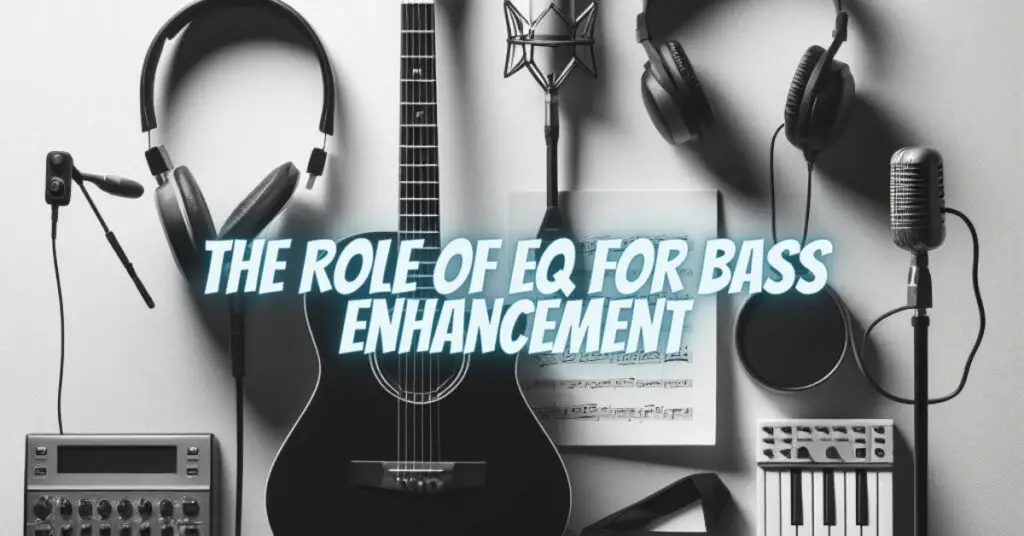Bass frequencies are a fundamental component of music and audio, providing depth and impact to the listening experience. When it comes to bass, the question often arises: Do you need EQ (Equalization) for bass enhancement? In this article, we will explore the significance of equalization in shaping and enhancing bass frequencies, helping you understand its role in achieving the desired audio quality.
Understanding Equalization (EQ)
Equalization is the process of adjusting the amplitudes (volumes) of specific frequency bands within an audio signal. An equalizer allows you to modify the balance of bass (low frequencies), midrange (mid frequencies), and treble (high frequencies) independently. This control over frequencies is used to correct deficiencies, emphasize particular characteristics, and tailor audio to specific preferences.
The Role of Equalization in Bass Enhancement
- Correcting Room Acoustics: One of the significant roles of EQ in bass enhancement is addressing room acoustics. The acoustics of a room, including dimensions, materials, and furnishings, can introduce issues like standing waves and resonances that affect bass frequencies. EQ can help mitigate some of these issues, resulting in a more balanced and less distorted bass response.
- Balancing the Mix: In audio production, EQ is used to balance the mix and ensure that bass frequencies do not overpower or get lost among other elements. By adjusting the bass frequencies, you can create a more cohesive and pleasant listening experience.
- Emphasizing Bass Characteristics: Equalization allows you to emphasize specific characteristics of the bass. For example, you can boost the sub-bass frequencies (20-40 Hz) to create a deeper and more resonant low end. Or you can boost the upper bass frequencies (80-120 Hz) to add warmth and punch.
- Correcting Frequency Imbalances: In some cases, audio recordings may exhibit imbalances in the bass frequencies, such as excessive boominess or lack of impact. EQ can be used to correct these issues, resulting in a more enjoyable listening experience.
When Do You Need EQ for Bass?
- Room Acoustics Issues: If you’re experiencing bass problems due to room acoustics, such as excessive resonances or dead spots, EQ can be a valuable tool to address these issues and achieve a more balanced bass response.
- Recording and Mixing: In audio production, EQ is an essential tool for balancing the mix and addressing frequency imbalances that may occur during recording and mixing. It is often necessary to use EQ to ensure that the bass sits well in the overall audio context.
- Personal Listening Preferences: EQ can be used when listening to music on various systems to tailor the bass response to personal preferences. For example, you may prefer a more pronounced bass when listening to hip-hop tracks but a more natural balance for classical music.
When Is EQ Not Needed for Bass?
- Quality Audio Equipment: High-quality audio equipment, including headphones and speakers, is designed to reproduce bass frequencies accurately. In such cases, minimal or no EQ may be required to achieve the desired bass quality.
- Well-Treated Listening Environment: In acoustically treated rooms with minimal issues related to room acoustics, bass frequencies may be accurately reproduced without the need for extensive EQ adjustments.
- Unaltered Audio: Some listeners prefer to experience music and audio content in their unaltered state, appreciating the original recording without EQ adjustments. In such cases, using EQ for bass enhancement may not be necessary.
Equalization is a valuable tool in shaping and enhancing bass frequencies, but its necessity depends on various factors. When addressing room acoustics issues, balancing audio mixes in production, or tailoring bass to personal preferences, EQ for bass can be highly beneficial. However, in settings with high-quality audio equipment and well-treated listening environments, or when enjoying audio in its unaltered state, extensive EQ for bass may not be needed. Ultimately, the decision to use EQ for bass enhancement depends on your specific goals and requirements for achieving the desired sound quality.


